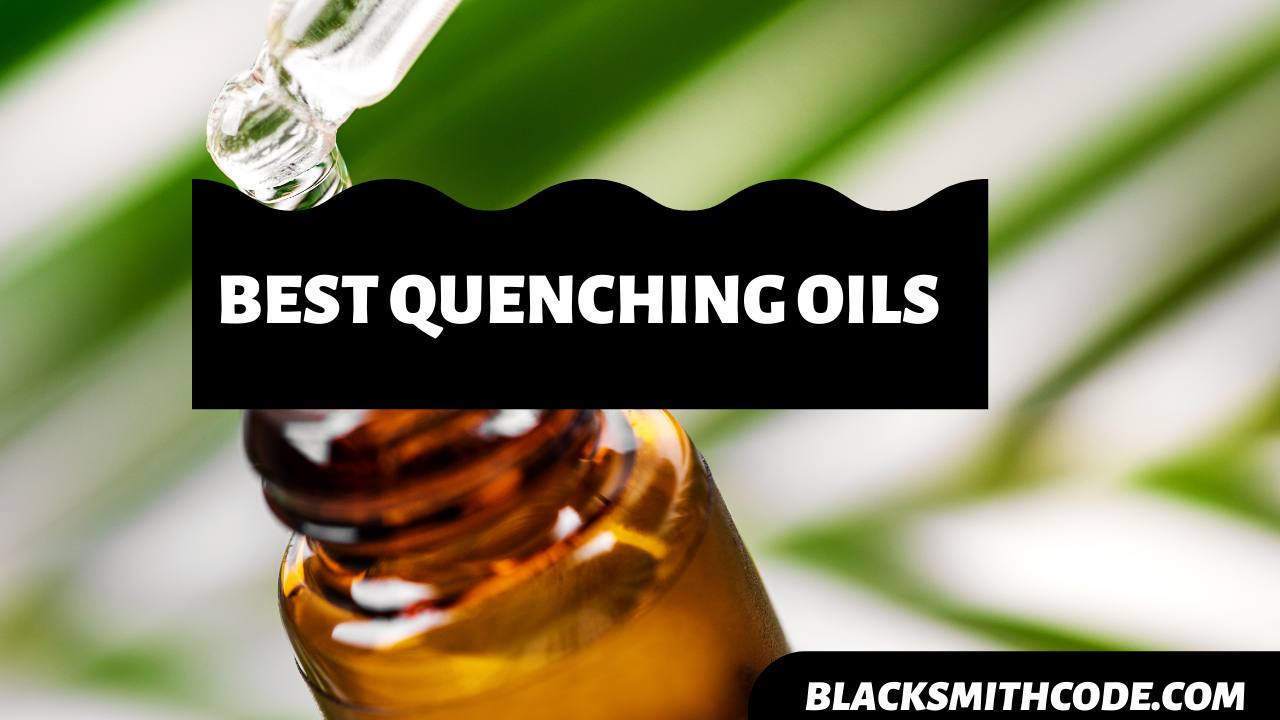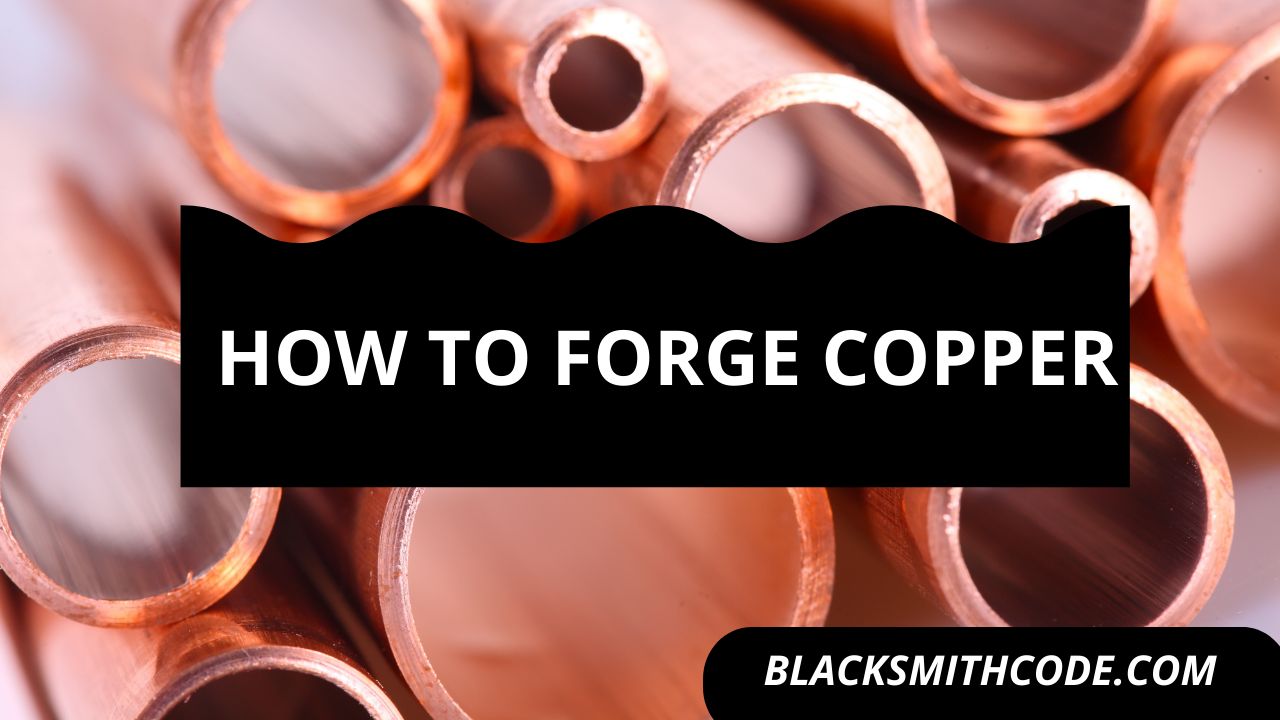Quenching is one of the essential blacksmithing techniques to harden heated metal stocks. It does not require any hi-fi machinery or whatsoever. You just have to dip the red/orange hot stock in a quenching medium, and that’s it. But you need to use a suitable quenching oil for blacksmithing to obtain the best result.
So, how does it work? Quenching is basically a means of rapidly cooling heated metal to alter its molecular structure. When the heated stock is subjected to rapid temperature change, the molecules inside it become densely packed, resultantly improving the hardness and durability.
Oil and water are used as quenching agents. Water might be a great option due to its higher specific heat, lower viscosity, and density, but specialized quenching oils also promise great efficiency.
Why do we recommend using oil? Oil is an excellent quenching medium for hardening, tempering, and other heat-treating processes. Rapid cooling can cause cracking in the metal due to uneven stresses. Oil, on the other hand, facilitates hardening metal as well as avoids unwanted thermal and transformational gradients by controlling heat transfer during quenching.
Even if you’re using oil, a cold oil bath may cause cracks and distortions in some metals. So, it is vital to assess the compatibility of the metal and quenching medium for better results.
And yes, you can use something as simple as motor oil, food-grade oil, and even automatic transmission fluids. In short, there is plenty of fish in the sea for quenching oils.
The properties of each option can vary greatly, and also, you should consider the price, availability, and compatibility with the type of steel you plan on using.
Here are some of the best quenching oils that every blacksmith can use to harden, temper, and teat treat their metal crafts.
The best quenching oil for blacksmiths and knife makers
It is a medium to medium-fast quench oil, making it perfect for blacksmiths and bladesmiths alike. This oil is an ideal choice for hardening and tempering blades and other metal crafts.
Why do we like it?
Having a good quenching oil is necessary to make something durable and reliable. The Park’s AAA quenching oil is very effective due to its 14.0 – 19.3 cSt viscosity at 100 °F. Because of its low viscosity, this oil can quickly dissipate heat from a quenched material.
How? Because a less viscous oil can quickly distribute heat so that hot-metal/air
interface does not reach or exceed its flash point.
The flash point for this oil is > 340 °F. Meaning, Park’s AAA is less likely to catch fire.
This is a commercial quenching oil that is specially synthesized to be used for quenching. Commercial oils like Park’s AAA might be more expensive than other options, but the amount of efficiency and effectiveness obtained from these is incomparable.
This quenching oil comes in a light amber color. The color might not be the deciding factor, but it does look better, duh.
Park’s AAA quenching oil is designed explicitly for austenitized steels. Austenitized steel is basically when iron-based metal is heated to such an extent that it changes its microstructure from ferrite to austenite.
The most crucial factor when it comes to quenching is the stability of the vapor blanket. It might be too technical, but a vapor blanket is formed around the metal when it is submerged in a quenching medium.
Pro Tip
Park’s AAA outperforms all its competitors in every aspect. Vapor blanket stability, nucleate boiling, and the cooling rate, this quenching oil keeps your metal craft safe from cracks and distortions during all stages of heat treating.
The cooling rate and effectiveness of a quenching oil are usually evaluated by performing a nickel ball test. For this specific product, the quench time is lies between 9 to 11 seconds.
Although there are no set criteria to judge quenching speed, still, considering the nickel ball test, this oil is viewed as a medium to medium-fast oil.
Quenching is indeed a high-temperature process, and even with a high flash point, commercial quenching oils can easily catch fire. We recommend that you use a metal container for quenching.
Also, an overheated quenching oil can reduce its life cycles. We recommend that you use Park’s AAA after pre-heating it to around 120 °F.
If you regularly work with O1, 5160, 1084, or 1080 steel, Park’s AAA should be your go-to quenching oil.
It will cost you some extra bucks, but the exceptional quenching quality and one-gallon jug capacity are more than enough in this budget.
Here are some of the pros and cons of this product.
Pros
Low viscosity (14.0 – 19.3 cSt @ 100 °F)
Does not crack the quenched material.
Ideal for higher alloy steels..
Cons
Not a good choice for high carbon steel.
Perfect for high carbon steels
Park’s 50 quenching oil is faster than our top pick and can also be used for high carbon steel. The only drawback is its high price.
Why do we like it?
Park’s 50 quenching oil also comes from USA Knifemaker. The manufacturer is experienced in sharpening tools, quenching oils, and everything related to forging and blacksmithing.
This commercial quenching oil is also light amber colored with a viscosity higher than 5.8 cSt at 100 °F. As mentioned earlier, low viscosity and a higher flash point are preferable.
Flash point for this quench oil is > 275°F. The main benefit of having a considerably higher flash point is that it avoids sludge formation. Sludge is the result of polymerization and oxidation of the quenching oils in use.
It clogs the coolers over time and consequently reducing the efficiency and effectiveness of the quench oil.
Moreover, the level of hardness obtained by this product is phenomenal. It works similar to water quenching, but here’s the catch, it slows down the cooling rate near the martensite formation range.
Because of this unique characteristic, it offers a quenching time of just 7 to 9 seconds in the nickel ball test. Furthermore, Park’s 50 quench oil provides the same level of efficiency at 50 °F and 120 °F. This is because of its low viscosity.
Similar to the last product, this one also operates efficiently in the 120 °F temperature range. But if you don’t have an oil tank with heaters, you can easily use it at even 50 °F. Moreover, reduced oil drag results in lesser consumption.
Quick Note:
As long as the quench oil remains in the 120 °F limit, it won’t cause any cracks and distortions. It is one of the fast quench oils that can handle W1, W2, 1095, and other high carbon steel alloys.
We recommend not using a plastic container as hot metal stocks can melt the plastic, causing holes and oil leakage. Also, when dealing with such high temperatures, you should always have a fire extinguisher nearby.
Pros
Lower viscosity.
Higher cooling rates.
Ideal for high carbon steel alloys.
1-gallon container.
Cons
Like any other commercial quench oil, it can catch fire.
Expensive as compared to the top pick.
Best quench oil, at the best value
The Black Bear #P5 is one of the more versatile, yet affordable quench oils. Apart from being used in quenching, it can be effective in machining, grinding, and hydraulic applications.
Why do we like it?
If you’re not looking for something expensive, this potent quench oil might just be the best budget option out there. The Black Bear #P5 is more of a general-purpose oil that can be used in a wide range of applications, making it one of the most suitable quenching oil for blacksmithing.
It can be used for rust protection, machining, emulsion stability, and quenching. It all depends on the concentration. For a specialized quench, you require a 10% concentration for the best results.
Black Bear #P5 is only suitable for low carbon steel alloys. It is a heavy amber oil with a neutral odor. The flash point for this is 325 °F.
Copper, brass, bronze, aluminum, magnesium, and zinc base alloys, this soluble oil can be used for all of them. The viscosity at 100 °F is 195.
Also, the pour point is -10 min with a specific gravity of 0.924 at 60 °F. The specifications are pretty decent for everyday quenching needs. It might not be as powerful and effective as the other options of this list, but for the low price tag, it performs really well.
Users have reported it to be a great option for low carbon steel alloys quenching. It avoids cracks, distortions, and sludge.
Like all other quench oils, this one can also catch fire. We recommend wearing the necessary protective gear while working with hot metal stocks.
Here are some of the pros and cons of this quench oil.
Pros
Made in the USA.
General-purpose oil.
Cons
Only suitable for low carbon steel alloys.
Everything we recommend
The best quenching oil for blacksmithing and knife making
It is a medium to medium-fast quench oil, making it perfect for blacksmiths and bladesmiths alike. This oil is an ideal choice for hardening and tempering blades and other metal crafts.
Buying options
Perfect for high carbon steels
Park’s 50 quenching oil is faster than our top pick and can also be used for high carbon steel. The only drawback is its high price.
Buying options
Best quench oil, at the best value
The Black Bear #P5 is one of the more versatile, yet affordable quench oils. Apart from being used in quenching, it can be effective in machining, grinding, and hydraulic applications.
Buying options
The research
Should you prefer low viscosity quench oil?
Is water a better alternative?
Can you use non-commercial quenching oils for heat treating?
Who should get this?
Quenching is the most widely used technique for hardening metal crafts. The rapid temperature change allows the hot metal stock to alter its molecular structure for improved durability and strength.
If you’re a blacksmith, bladesmiths, or a knifemaker, you definitely need some quenching medium to harden your workpiece. Commercial quenching oils perform really well without cracking your workpiece.
Why should you trust us?
We have been in the blacksmithing business for quite some time. Our team considers all the possible drawbacks of each product before including it on the list. Furthermore, with several professional blacksmith’s on board, we are very well aware of which product delivers exceptional performance.
All of our top picks are subjected to on-field testing. As for quenching oils, we carefully evaluated the viscosity, availability, and compatibility of each one before putting them up in this list.
How we picked the best quenching oil for blacksmithing?
Here are some of the most crucial factor we considered while compiling this list:
- Viscosity: Heat transfer during quenching is exponentially dependent on the viscosity of the oil. The lower the viscosity, the high the heat transfer rate. The thermo-siphon effect helps in quickly dissipating heat through the less viscous quench oils.
- Quenching Speed: It is how fast the quenching oil can cool an orange hot metal piece. It is either given as a ratio compared to water or the nickel ball test. It just provides us with the time required to reach a specific temperature.
- Water Content: Water is not soluble in oils. If a quenching oil has a significant amount of it, it can cause cracks, uneven hardness, and soft spots on the workpiece. We have tested several quenching oils and have only included the ones that have less than 0.1 percent water content.
How we tested quenching oil for blacksmithing?
Relying on verified customer reviews and product specifications is good, but we wanted to go the extra mile. After narrowing down our options, we put the top-picks to use. Our team of professional blacksmiths used all of these quenching oils for actual projects and carefully observed their thermal conductivity, quenching speed, and flash points.
After a detailed analysis of the pros and cons of each quench oil, we filtered the top three to include in our list.
Care and maintenance tips
The majority of the commercial quenching oils are biodegradable and won’t give out any harmful compounds. But still, forging and quenching does include some toxic gases that can be avoided by wearing a respirator.
It is highly recommended that you used a metal container for storing quench oil. Heated metals can melt a plastic container causing unwanted holes and oil leakage. Some quench oils have low flash points casing them to be flammable at lower temperatures. It crucial to have a fire extinguisher nearby.
Should you prefer low viscosity quench oil?
No, metal requires a coarse belt on a powerful motor. A wood grinder generally works on lower revolutions per minute and hence proves to be ineffective on metal.
Is water a better alternative?
Water is indeed a great quench agent for some steel alloys. It does offer a higher thermal conductivity, specific heat & density, and lower viscosity. But for some metals, it can cause cracks and distortions in the microstructure due to its rapid cooling.
Can you use non-commercial quenching oils for heat treating?
The short answer is yes; you can use them for quenching. But the effectiveness and efficiency of these specialized commercial quenching oils are much higher than the former.
Conclusion
Hardening your workpiece is a crucial part of every blacksmithing project. Your customers want something that looks good and can last for a hell of a long time. A good quality quenching oil promises improved hardness and strength.
For high carbon steel, Park’s 50 is the best option. Due to its unique properties, it could’ve been our top pick, but due to a slight price difference, the Park’s AAA has managed to secure the first spot. Nonetheless, all of these options are great as they provide the right balance of price and performance.








